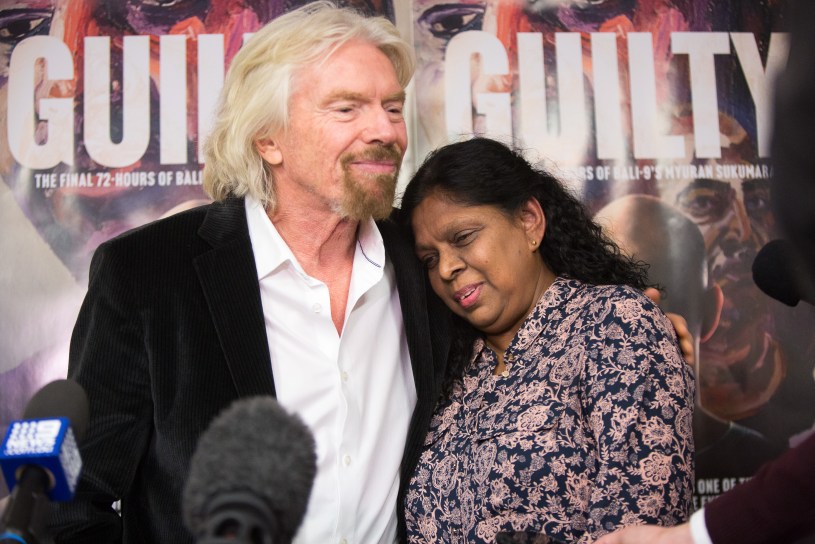Sir Richard Branson and Raji Sukumaran at the World Day screening of ‘Guilty’ (Photo credit: Peter Casamento)
Matthew Sleeth’s Guilty, the feature documentary which chronicles the final 72 hours of Bali 9 convicted criminal Myuran Sukumaran before his execution in 2015, continues to have a powerful impact internationally.
The Australian government tied the launch of its strategy for the abolition of the death penalty to national screenings of Guilty last October on the World Day Against the Death Penalty.
Next, the film produced by Maggie Miles, who co-wrote the script with Sleeth and Matthew Bate, will screen at the triennial World Congress for Abolition of the Death Penalty in the Egmont Palace library in Brussels on March 1.
Miles will host a post-screening discussion with Sukumaran’s lawyer Julian McMahon SC, the president of Reprieve Australia, on the relationship between art and the death penalty. Sukumaran became an accomplished artist while he was on death row, tutored by Ben Quilty.
Sir Richard Branson, a long-time anti-death penalty campaigner, who introduced a screening of the film on World Day, will speak at the Congress.
Ndume Olatushan, who spent 28 years in prison in the US for a crime he did not commit and taught himself to paint while on death row, has been invited to join the panel.
“Our key aim has been to lend the voice of the film to the incredible work of organisations working tirelessly to abolish the death penalty,” Miles, who is spearheading the Good Pitch impact campaign with Reprieve Australia, tells IF.
“Human Rights Watch Australia and Amnesty International Australia have embraced our screenings as platforms to urge people to join the movement to end the death penalty, as have the Human Rights Law Centre and Virgin Unite.”
Monash University and Reprieve Australia launched the Monash Anti-Death Penalty Clinic last year, now a permanent element of the curriculum, using Guilty as the opening session with students.
“The extent to which Guilty has been embraced by those partners shows we’re on the right track,” she says. “Extraordinarily, our three-year campaign began as Australia took its seat on the United Nations Human Rights Council, a seat won on strong abolition platform.
“Our World Day screenings event was pitched to the UN as the Australian community was reiterating its opposition to the death penalty at a time when the biennial resolution on the death penalty was taking place at the UN. The vote count of those supporting the resolution increased from 117 to 123, a significant jump, particularly as the numbers had been stagnant for several years. Malaysia was the most notable change in our region, voting yes for the first time.”
Sukumaran’s mother Raji was involved in the production of the film and is playing a pivotal part in the campaign.
Madman Entertainment and Demand Film distributed the doc, which features Adam McConvell as Sukumaran, Bela Kusumah Kasim as the Indonesian guard and Pastor Christie Buckingham as herself, in Australian cinemas. The title will be released on home entertainment on World Day in October. LevelK is handling international sales.
Co-funded by HIVE, Guilty had its world premiere at the Adelaide Film Festival and was then broadcast on the ABC, marking the third anniversary of the executions of Sukumaran and Andrew Chan, last April.
In May the film will screen at the 1905 Human Rights Film Festival in Taiwan, interesting timing given the Chinese government’s recent death sentence for convicted Canadian drug smuggler Robert Schellenberg.
Miles concludes: “The social and political impact of the film within the context of the abolition movement in Australia and internationally is tangible. We’re humbled to bring a compelling human dimension to the issue.”


